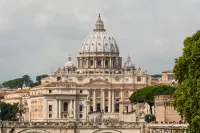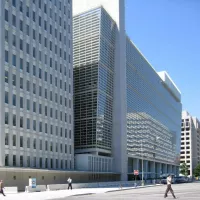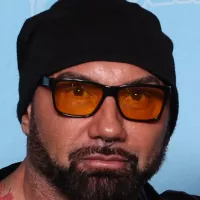North Macedonia is a landlocked country in Southeast Europe, bordering Greece, Albania, Bulgaria, Kosovo, and Serbia. Skopje is its capital and largest city. The population is around 1.83 million, primarily ethnic Macedonians, with a significant Albanian minority (approximately 25%), along with Turks, Roma, Serbs, Bosniaks, Aromanians, and other minorities. It occupies roughly the northern third of the geographical region of Macedonia.
1903: Ilinden Uprising
In 1903, IMRO organized the Ilinden–Preobrazhenie Uprising against the Ottomans, leading to the forming of the Kruševo Republic, which was later crushed.
1905: Renaming of SMARO
In 1905, the Secret Macedonian-Adrianople Revolutionary Organization (SMARO) was renamed the Internal Macedonian-Adrianople Revolutionary Organization (IMARO).
1912: Balkan Wars
Following the two Balkan Wars of 1912, most of the territory that was to become North Macedonia was annexed by Serbia.
1912: End of Ottoman Rule
Until the end of Ottoman rule in 1912, Macedonia was part of vilayets of Manastir, Kosova and Selanik.
1918: Offer from Bulgaria
In 1918, the Bulgarian government of Alexander Malinov offered to give Pirin Macedonia after World War I.
1918: Establishment of Macedonian Byzantine Catholic Church
In 1918, the Macedonian Byzantine Catholic Church was established, primarily consisting of converts to Catholicism and their descendants.
1919: Strumica Annexation
After the Treaty of Neuilly-sur-Seine in 1919, the Strumica region was annexed to Serbian Macedonia.
1923: Association against Bulgarian Bandits
In 1923 in Stip, a paramilitary organisation called Association against Bulgarian Bandits was formed by Serbian chetniks, IMRO renegades and Macedonian Federative Organization (MFO) members to oppose IMRO and MMTRO.
1924: Comintern Suggestion
In 1924, the Communist International (Comintern) suggested that all Balkan communist parties adopt a platform of a "United Macedonia" but the suggestion was rejected by the Bulgarian and Greek communists.
1929: Kingdom Renamed
In 1929, the Kingdom was officially renamed the Kingdom of Yugoslavia, and South Serbia, including all of present-day North Macedonia, became the Vardar Banovina.
October 1934: Assassination of Alexander I
On October 9, 1934, IMRO member Vlado Chernozemski assassinated Alexander I of Yugoslavia.
1934: Comintern Resolution
In 1934, the Comintern issued a special resolution recognizing the existence of a separate Macedonian nation and Macedonian language.
1940: Serbian Colonies Established
By 1940, about 280 Serbian colonies were established in present-day North Macedonia as part of the government's internal colonisation program.
1943: Partisan Resistance
After 1943, harsh rule by the occupying forces encouraged many Vardar Macedonians to support the Communist Partisan resistance movement of Josip Broz Tito, and the National Liberation War ensued.
October 1944: Bulgarian troops fought to old borders
In October 1944, Bulgarian troops in Vardar Macedonia, surrounded by German forces, fought their way back to Bulgaria's old borders. The new Bulgarian pro-Soviet government mobilized and reorganized four armies, which re-entered occupied Yugoslavia to block German forces withdrawing from Greece.
December 1944: ASNOM proclaimed the People's Republic of Macedonia
In December 1944, the Anti-fascist Assembly for the National Liberation of Macedonia (ASNOM) proclaimed the People's Republic of Macedonia as part of the People's Federal Republic of Yugoslavia.
1945: Establishment as a constituent state of Yugoslavia
In 1945, North Macedonia was established as a constituent state of communist Yugoslavia.
1946: Macedonian communists supported Greek communists during civil war
During the civil war in Greece, in 1946, Macedonian communist insurgents supported the Greek communists, leading to many refugees fleeing to the Socialist Republic of Macedonia.
1946: Bulgaria agreed to give Bulgarian Macedonia to United Macedonia
In 1946, compelled by the Soviet Union, the Bulgarian Communist government led by Georgi Dimitrov agreed to give Bulgarian Macedonia to a United Macedonia.
1947: Opening of the National Opera
In 1947, the National Opera opened, then named "Macedonian Opera", with a performance of Cavalleria rusticana.
1947: Bulgaria confirmed unification of Macedonian region
In 1947, with the Bled agreement, Bulgaria formally confirmed the envisioned unification of the Macedonian region, but postponed the act and accepted the existence of a separate Macedonian ethnicity and language.
1949: Civil war in Greece
During the civil war in Greece, in 1949, Macedonian communist insurgents supported the Greek communists, leading to many refugees fleeing to the Socialist Republic of Macedonia.
1952: Release of Frosina
In 1952, Frosina, directed by Vojislav Nanović, was released as the first Macedonian feature film.
1958: Release of Miss Stone
In 1958, Miss Stone, the first feature film in color, was released.
1963: Skopje earthquake
In 1963, Skopje was heavily damaged by a major earthquake, killing over 1,000.
1963: Macedonia renamed Socialist Republic of Macedonia
In 1963, following the federation's renaming as the Socialist Federal Republic of Yugoslavia, the People's Republic of Macedonia was renamed the Socialist Republic of Macedonia.
1967: Macedonian Orthodox Church Declares Autocephaly
In 1967, the Macedonian Orthodox Church declared autocephaly, but it remained unrecognised by other Orthodox Churches at the time.
May 1972: First May Opera Performance
In May 1972, the first May Opera performance was that of Kiril Makedonski's Tsar Samuil.
1989: First Private Television Channel
In 1989, TEKO TV from Štip became the first private television channel in North Macedonia.
September 1991: Independence Day
North Macedonia officially celebrates 8 September 1991 as Independence Day, with regard to the referendum endorsing independence from Yugoslavia.
1991: Darko Pančev Wins European Golden Boot
In 1991, Darko Pančev won the European Golden Boot award and scored the winning penalty in the European Cup Final.
1991: Peaceful Secession
In 1991, North Macedonia peacefully seceded from Yugoslavia.
1991: Republic of Macedonia
In 1991, after the breakup of Yugoslavia, the federal entity declared independence and changed its official name to the "Republic of Macedonia".
1991: Naming dispute reignited
In 1991, the naming dispute between Greece and North Macedonia was reignited after North Macedonia's independence from Yugoslavia, with Greece opposing the use of "Macedonia" without a qualifier.
1991: Naming dispute between Greece and North Macedonia.
In 1991, the specific naming dispute was reignited after the breakup of Yugoslavia and the newly gained independence of the former Socialist Republic of Macedonia.
1991: Macedonia seceded from Yugoslavia
In 1991, the state peacefully seceded from Yugoslavia and removed "Socialist" from its name.
1991: Constitution of North Macedonia
The Constitution of North Macedonia was implemented shortly after the country's independence in 1991, limiting the powers of the government and military, and declaring Skopje as the capital.
January 1992: EC recognition recommended; Bulgaria recognised independence
In January 1992, Robert Badinter recommended EC recognition of Macedonia. On 15 January 1992, Bulgaria was the first country to recognise the independence of the republic.
1992: Foundation of PTT Macedonia
In 1992, North Macedonia Post was founded as PTT Macedonia, the state-owned company for postal traffic provision.
1992: Creation of Basketball Federation
In 1992, the Basketball Federation of North Macedonia was created.
1992: North Macedonia joins the IMF
North Macedonia became a member of the IMF in 1992.
April 1993: North Macedonia joins the UN
On 8 April 1993, North Macedonia became a member state of the UN, eighteen months after its independence from Yugoslavia.
1993: UN Membership
In 1993, North Macedonia became a member of the United Nations (UN) under the provisional name "the former Yugoslav Republic of Macedonia" due to a dispute with Greece.
1993: North Macedonia joins WHO, EBRD, and Central European Initiative
In 1993, North Macedonia became a member of the World Health Organization (WHO), the European Bank for Reconstruction and Development (EBRD), and the Central European Initiative.
1993: Admission to the World Postal Union
In 1993, PTT Macedonia was admitted to the World Postal Union.
1993: UN Adopts Provisional Reference
In 1993, the UN adopted the provisional reference "the former Yugoslav Republic of Macedonia" when the country was admitted to the organization.
1993: Public Channel Founding
In 1993, the public channel Macedonian Radio Television was founded by the Assembly of North Macedonia.
1994: Before the Rain Academy Award Nomination
In 1994, Milcho Manchevski's film Before the Rain was nominated for an Academy Award in the category of Best International Feature Film.
1994: Greek trade embargo
In 1994, the economy of North Macedonia was affected when Greece imposed a trade embargo on the Republic.
November 1995: End of Bosnian War
Some relief was afforded to the economy of North Macedonia by the end of the Bosnian War in November 1995.
1995: North Macedonia joins Council of Europe and OSCE
In 1995, North Macedonia joined the Council of Europe and the Organization for Security and Co-operation in Europe (OSCE).
1995: Interim Accord of 1995
The Prespa agreement replaced the bilateral Interim Accord of 1995.
September 1996: Establishment of 123 municipalities
In September 1996, 123 municipalities were established in North Macedonia as part of the local government organization.
1996: North Macedonia joins SECI
North Macedonia became a member of the South East European Cooperative Initiative (SECI) in 1996.
1996: Steady economic growth since 1996
Since 1996, North Macedonia has witnessed steady, though slow, economic growth.
1997: Division of PTT Macedonia
In 1997, PTT Macedonia was divided into Macedonian Telekom and Macedonian Post (later renamed North Macedonia Post).
2000: First Olympic Medal
At the 2000 Summer Olympics, Magomed Ibragimov won the bronze medal in freestyle wrestling, which was the first medal for the independent country of North Macedonia.
August 2001: Conflict ended with Ohrid Agreement
In August 2001, a conflict between the government and ethnic Albanian insurgents ended with the intervention of a NATO ceasefire monitoring force and the signing of the Ohrid Agreement.
2001: North Macedonia joins La Francophonie
In 2001, North Macedonia joined La Francophonie.
2001: Conflict between government and ethnic Albanian insurgents
In 2001, a conflict took place between the government and ethnic Albanian insurgents, mostly in the north and west of the country.
2001: Armed Conflicts Impact Tourism
In 2001, the armed conflicts in North Macedonia had a serious negative impact on tourism performance.
2001: War between communities led to a power-sharing agreement
In 2001, the issue of the power balance between the two communities led to a brief war, following which a power-sharing agreement was reached.
2001: Railway Line Construction
Since 2001, the Beljakovci railway line has been under construction to connect Skopje with Sofia via the border with Bulgaria.
2001: Albanian crisis
The 2001 Albanian crisis caused further destabilisation to North Macedonia's economy.
2002: Kometal Gjorče Petrov Skopje Wins EHF Women's Champions League
In 2002, Kometal Gjorče Petrov Skopje won the EHF Women's Champions League.
November 2003: Darko Pančev Selected as Golden Player
In November 2003, Darko Pančev was selected as the Golden Player of Macedonia to celebrate UEFA's jubilee, recognizing him as their most outstanding player of the past 50 years.
2003: Human rights concerns
In 2003, human rights organizations reported suspected extrajudicial executions, threats and intimidation of human rights activists and opposition journalists, and allegations of torture by the police in North Macedonia.
2003: North Macedonia joins WTO
North Macedonia became a member of the World Trade Organization (WTO) in 2003.
August 2004: Country reorganized into municipalities
In August 2004, North Macedonia was reorganized into 84 municipalities, including the City of Skopje.
August 2004: Legislation passed redrawing local boundaries
In August 2004, parliament passed legislation redrawing local boundaries and giving greater local autonomy to ethnic Albanians in areas where they predominate.
2005: Unemployment rate
As of 2005 North Macedonia's unemployment rate was 37.2%.
2005: Recognized as an EU candidate state
In 2005, North Macedonia was officially recognized as a European Union candidate state.
2005: GDP growth of 3.1%
In 2005, North Macedonia's GDP grew by 3.1%.
2005: EU Candidacy
Since 2005, North Macedonia has been a candidate for joining the European Union.
July 2006: Democratic change of government
After a troublesome pre-election campaign, North Macedonia saw a relatively calm and democratic change of government in the elections held on 5 July 2006.
2006: Poverty Rate
As of 2006 North Macedonia's poverty rate was 22%.
2006: Inflation rate of 3%
In 2006, North Macedonia had an inflation rate of only 3%.
2006: North Macedonia joins CEFTA
In 2006, North Macedonia joined the Central European Free Trade Agreement (CEFTA).
2006: VMRO-DPMNE government pursued a policy of "Antiquisation"
Upon coming to power in 2006, the VMRO-DPMNE government pursued a policy of "Antiquisation" for domestic identity-building and to pressure Greece.
2007: End of conscription
Conscription ended in North Macedonia in 2007 and it has been a volunteer military since then.
2007: Inflation rate of 2%
In 2007, North Macedonia had an inflation rate of 2%.
2007: Increase of information technology market
In 2007, North Macedonia's information technology market increased 63.8% year on year.
2007: Armed confrontations with Albanian militant groups
In 2007, the Macedonian security forces had armed confrontations with Albanian militant groups.
2007: Flat tax system
In 2007, the flat tax rate in North Macedonia was 12%.
2008: VMRO-DPMNE and DUI form a ruling coalition
In 2008, following early parliamentary elections, VMRO-DPMNE and the Democratic Union for Integration (DUI) established a ruling coalition in North Macedonia.
2008: European Women's Handball Championship
In 2008, the European Women's Handball Championship took place in North Macedonia, with the women's national team finishing seventh place.
2008: Flat tax rate lowered to 10%
In 2008, the flat tax rate in North Macedonia was further lowered to 10%.
March 2009: European Parliament supports EU candidacy
In March 2009, the European Parliament supported North Macedonia's EU candidacy and called for the start of accession talks by the end of the year.
April 2009: Presidential and local elections
In April 2009, North Macedonia conducted peaceful presidential and local elections, a crucial step for EU aspirations. The VMRO-DPMNE party won the local elections, and Gjorgi Ivanov was elected president in April 2009.
2009: Best reformatory state
In 2009, North Macedonia was ranked as the fourth "best reformatory state" out of 178 countries by the World Bank.
2010: Projected GDP growth
GDP was projected to rise to an average of 5.2% in the 2006-2010 period.
2010: Pew Research Estimation
In 2010, a Pew Research estimation determined that 1.4% of North Macedonia's population was "unaffiliated" with any religion.
2011: Religious Buildings
At the end of 2011, there were 1,842 churches and 580 mosques in North Macedonia.
2011: Increase in Foreign Visitors
In 2011, North Macedonia experienced a 14.6% increase in the number of foreign visitors.
2011: EuroBasket Finish
In 2011, North Macedonia's national basketball team finished at 4th place in EuroBasket.
October 2012: EU proposes accession negotiations
In October 2012, EU Enlargement Commissioner Štefan Füle proposed the start of accession negotiations with North Macedonia for the fourth time, but the previous efforts were blocked each time by Greece and Bulgaria.
2012: Inter-ethnic tensions flared in Macedonia
In 2012, Inter-ethnic tensions flared in Macedonia with incidents of violence between ethnic Albanians and Macedonians.
2012: Men's National Team at European Championship
In 2012, the country's men's national handball team finished fifth at the European Championship.
2012: GDP structure
In 2012, the manufacturing sector in North Macedonia constituted 21.1% of the GDP.
2013: GDP structure
As of 2013, the manufacturing sector in North Macedonia constituted the largest part of GDP at 21.4%.
2014: Largest export sector
In 2014, North Macedonia's largest export sector was "chemicals and related products" at 21.4%.
2015: Armed confrontations with Albanian militant groups
In 2015, the Macedonian security forces had armed confrontations with Albanian militant groups.
2015: Men's National Team at World Championship
In 2015, the country's men's national handball team finished ninth at the World Championship.
2015: Unemployment rate decreases
In the first quarter of 2015, North Macedonia's unemployment rate decreased to 27.3%.
2016: Antiquisation partially reversed
After the Prespa agreement, after 2016 the new SDSM government of North Macedonia partially reversed the Antiquisation policy.
2016: RK Vardar Wins EHF Champions League
In 2016, RK Vardar won the EHF Champions League.
2016: Tourism Contribution to GDP
In 2016, tourism accounted for 6.7% of North Macedonia's GDP, with an estimated annual income of 38.5 billion denars (€616 million) from tourism.
April 2017: Protesters stormed the Macedonian Parliament
In April 2017, about 200 protesters stormed the Macedonian Parliament in response to the election of Talat Xhaferi as the Speaker of the Assembly.
June 2017: Zoran Zaev becomes Prime Minister
In June 2017, Zoran Zaev of the Social Democratic Party became the new Prime Minister of North Macedonia, marking the end of 11 years of VMRO-DPMNE rule.
August 2017: Friendship agreement with Bulgaria signed
In August 2017, the Republic of Macedonia signed a friendship agreement with Bulgaria, aiming to end "anti-Bulgarian ideology" and resolve historical issues.
2017: Bulgaria friendship treaty
Bulgaria provided explanation from the Bulgarian side as no implementation of the friendship treaty from 2017.
2017: PPS GDP per capita
In 2017, North Macedonia's PPS GDP per capita stood at 36% of the EU average.
2017: Distribution of Tourists
In 2017, approximately 60% of the million tourists who visited North Macedonia were located in Skopje and the southwestern region.
June 2018: Prespa Agreement
In June 2018, the Prespa agreement was signed, which saw the country change its name to the "Republic of North Macedonia" eight months later.
June 2018: Name Dispute
Prior to June 2018, the use of the name "Macedonia" was disputed between Greece and the then-Republic of Macedonia.
June 2018: Prespa agreement signed with Greece
Under the Prespa agreement, signed with Greece on 17 June 2018, the country agreed to change its name to the Republic of North Macedonia and stop public use of the Vergina Sun.
2018: RK Vardar Wins EHF Champions League
In 2018, RK Vardar won the EHF Champions League.
2018: Dispute Resolution
In 2018, the dispute with Greece was resolved with an agreement to rename the country "Republic of North Macedonia".
January 2019: Vote to Amend Constitution
On 11 January 2019, the vote to amend the constitution and change the name of the country passed in favor of the amendment.
February 2019: North Macedonia signed accession protocol to NATO
On 6 February 2019, North Macedonia signed the accession protocol to NATO. On 8 February, the Greek parliament ratified the protocol. On 12 February, the Macedonian government announced the formal activation of constitutional amendments renaming the country as North Macedonia.
May 2019: Stevo Pendarovski sworn in as President
In May 2019, Stevo Pendarovski was inaugurated as the President of North Macedonia.
2019: Road Network Extent
As of 2019, North Macedonia had 10,591 km of roads, with about 6,000 km being paved.
2019: Resolution of naming dispute
Following the ratification of the Prespa agreement in 2019, most major international organizations welcomed the settlement of the long-standing naming dispute and adopted North Macedonia's new name.
2019: Release of Honeyland
In 2019, Honeyland, directed by Tamara Kotevska and Ljubomir Stefanov, was released.
2019: Tourist Arrivals in North Macedonia
In 2019, North Macedonia had 1,184,963 tourist arrivals, with 757,593 being foreign tourists.
2019: EU approved the start of accession talks
In 2019, The withdrawal of the Greek veto, along with the signing the friendship agreement with Bulgaria, resulted in the European Union approving the start of accession talks, which were expected to take place in 2019, under the condition that the Prespa deal was implemented.
2019: Renaming into Effect
In early 2019, the renaming of the country to "Republic of North Macedonia" came into effect.
2019: Forest Landscape Integrity Index
North Macedonia had a 2019 Forest Landscape Integrity Index mean score of 7.42/10, ranking it 40th globally out of 172 countries.
2019: Albanian Co-Official Language
Since 2019, Albanian became co-official at a state level in North Macedonia (excluding defense, central police, and monetary policy).
2019: Local government functions divided between 80 municipalities
Since 2019, local government functions are divided between 80 municipalities. The capital, Skopje, is governed as a group of ten municipalities collectively referred to as the "City of Skopje".
January 2020: Oliver Spasovski acting Prime Minister
As of January 2020, Oliver Spasovski was the acting Prime Minister of North Macedonia and Talat Xhaferi was the president of the Parliament, the election of Xhaferi was immediately met with protests led by VMRO-DPMNE.
March 2020: North Macedonia joins NATO
Following the Prespa agreement, North Macedonia became a member state of NATO on 27 March 2020.
July 2020: Early parliamentary elections
Early parliamentary elections were held in North Macedonia on 15 July 2020.
August 2020: Zoran Zaev Prime Minister again
In August 2020, Zoran Zaev resumed his role as the Prime Minister of North Macedonia.
November 2020: Bulgaria refused to approve the European Union's negotiation framework
On 17 November 2020, Bulgaria refused to approve the European Union's negotiation framework for North Macedonia, effectively blocking the official start of accession talks.
2020: North Macedonia joins NATO
In 2020, North Macedonia became a member of the North Atlantic Treaty Organization (NATO).
2020: Honeyland Academy Award Nominations
In 2020, the documentary Honeyland (2019) received nominations in the categories for Best International Feature Film and Best Documentary Feature at the 92nd Academy Awards.
October 2021: Zoran Zaev announces resignation
In October 2021, Prime Minister Zoran Zaev announced his resignation following losses in local elections.
2021: Ethnic Groups
Based on the 2021 census data, the largest ethnic group in North Macedonia is the ethnic Macedonians, with Albanians as the second largest group.
January 2022: Dimitar Kovačevski elected as prime minister
In January 2022, Dimitar Kovačevski was elected as the prime minister of North Macedonia, leading a coalition cabinet composed of Social Democrats and ethnic Albanian parties.
July 2022: Accession talks for the accession of North Macedonia to the EU officially began
In July 2022, protests broke out over the French proposal for the accession of North Macedonia to the EU. The accession talks for the accession of North Macedonia to the EU officially began after the French proposal was passed by the Assembly of North Macedonia.
2022: Recognition of the Macedonian Orthodox Church
In 2022, the Macedonian Orthodox Church restored relations with the Serbian Orthodox Church and the Ecumenical Patriarchate, leading to recognition from other churches.
2023: Military Budget
As of 2023 North Macedonia had a military budget of US$275 million.
2023: Unfulfilled constitutional changes
The 2023 European Commission Progress Report has cited the unfulfilled constitutional changes, as the primary reasons for the blocking of the further country's accession path.
May 2024: Gordana Siljanovska-Davkova takes office
On 12 May 2024, Gordana Siljanovska-Davkova took office as North Macedonia's first female president.
September 2024: EU announced the separation of Albania from North Macedonia
On 25 September 2024, the EU announced the separation of Albania from North Macedonia on the EU accession path, due to the disputes between North Macedonia and Bulgaria.
October 15, 2024: EU opened negotiations on the first chapters with Albania
On October 15, 2024, Following the decision, the EU opened negotiations on the first chapters with Albania separately.
2024: Army of the Republic of North Macedonia
As of 2024 the Army of the Republic of North Macedonia (ARSM) had 8,000 active personnel and 4,850 reservists.
2024: Jovan Mitreski president of Parliament
As of 2024 the current president of Parliament in North Macedonia is Jovan Mitreski.
2024: Global Innovation Index Ranking
In 2024, North Macedonia was ranked 58th in the Global Innovation Index.
Mentioned in this timeline

Basketball is a team sport played on a rectangular court...
The Union of Soviet Socialist Republics USSR existed from to...
Albania is a country in Southeast Europe situated on the...

The Catholic Church the largest Christian church globally with over...

Inflation in economics signifies an increase in the average price...

The World Bank is an international financial institution offering loans...
Trending
2 months ago Rome man arrested after shooting at car in Verona, New York.

3 months ago Alex Eala Enters Hong Kong Campaign with Career-High Ranking, World No. 51

8 months ago Pete Carroll envisions Jeanty & Mostert as 'Thunder and Lightning' in Raiders backfield.

Dave Bautista born David Michael Bautista Jr is an American actor and retired professional wrestler He achieved significant recognition during...

3 months ago Ben Shelton faces Kamil Majchrzak at ATP Basel after Rune's setback: Predictions.

6 months ago Ryan Reynolds Hints at Deadpool Joining Avengers in Cryptic Instagram Post
Popular

Thomas Douglas Homan is an American law enforcement officer who...

William Franklin Graham III commonly known as Franklin Graham is...

Jupiter is the fifth and largest planet from the Sun...

XXXTentacion born Jahseh Dwayne Ricardo Onfroy was a controversial yet...

Instagram is a photo and video-sharing social networking service owned...

Kristi Noem is an American politician who has served as...